On Thursday night eExtra hosted a Kuiertyd shindig at e's studios in the downtown Cape Town and TVSA was there, in Turkwood...
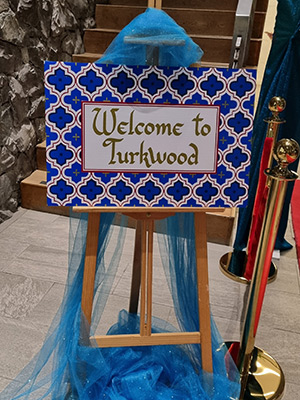
It was a celebration of eExtra's Afrikaans-dubbed Turkish novelas starring hardcore fans and the voiceover artists who dub the series.
We partied the night away in between meeting Die Put's Number 1 fan while gathering goss for you:
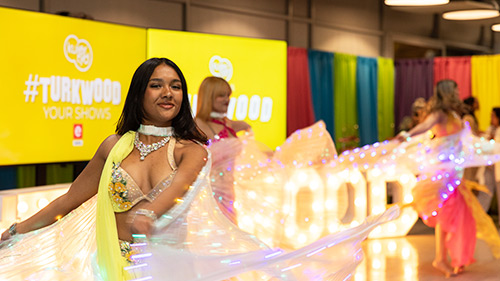
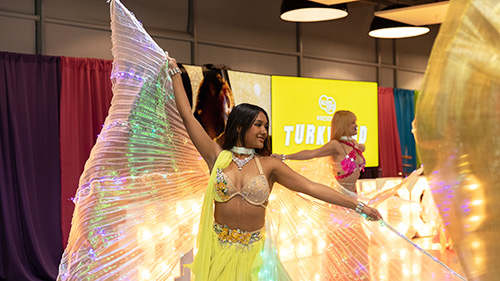
Turkish food and belly dancers galore - that was the mood.
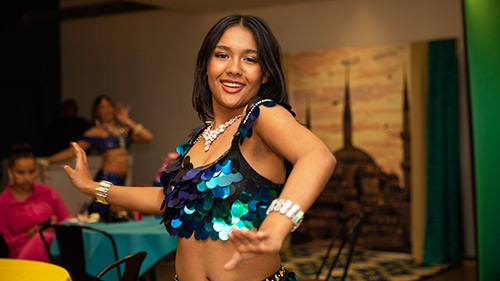
They danced in between the audience too and weren't afraid to keep extended eye contact with you as they hula hooped their bellybuttons in a most voluptuous way.
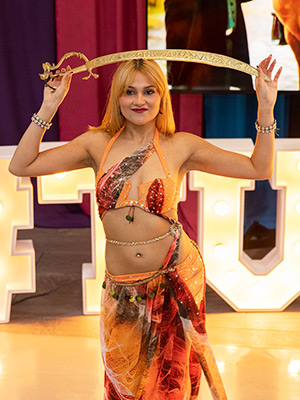
Some turned dangerous, looking at you as if you were in trouble and needed a spanking with a sword.
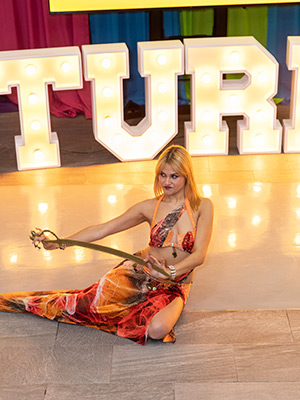
Ouch.
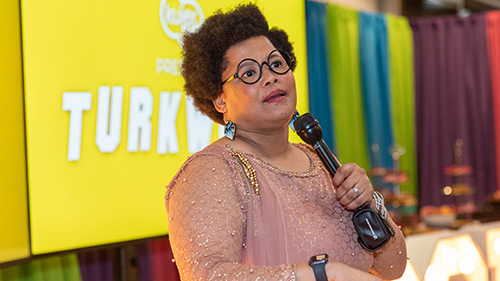
TV and radio presenter and voiceover artist Lyntjie Jaars was the MC for the night and revealed an insider secret about the voicing of the shows - code name: "Miscellaneous".
Turns out this is how many of the voiceover artists began their training.
It's an internship of sorts - they start by voicing "Miscellaneous characters" before landing a featured voice role.
Like Tammy Lee Simpson...
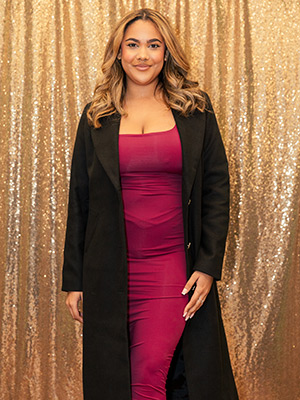
She's voicing her first featured role in an upcoming new series called Pad Na die Hart (Road to the Heart) where she's dubbed the role of Gullendam.
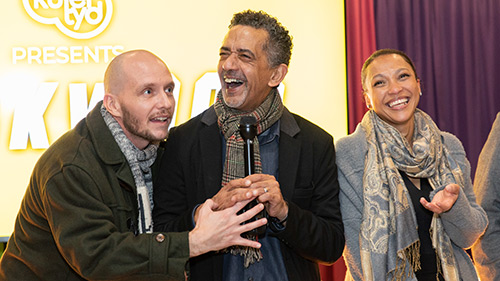
Other voices spotted: Martin Venter (Yamaç on Die Put), Noel Oostendorp (Alico on Die Put) and Joce Engelbrecht (Hazal on Die Binnekring).
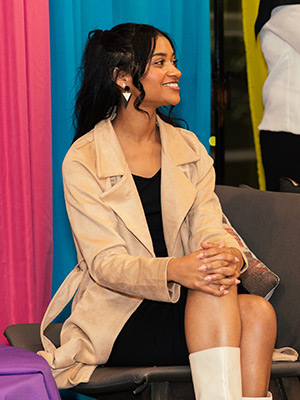
And our award for Best Dressed of the Night goes to... Meggan-Lee Johnstone.
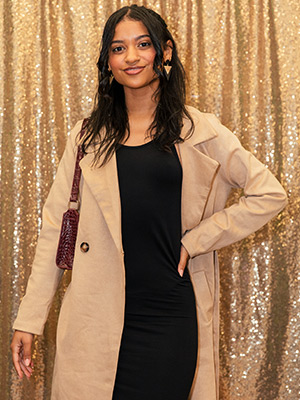
Eda on #DisComplicated. You may also know her from Arendsvlei as Cherry or as Leigh-Anne on Blood & Water 3.
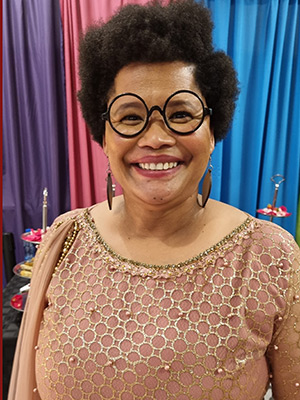
Lyntjie voiced Ayfer on #DisComplicated.
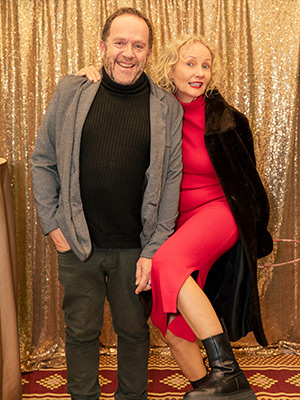
Ronel Geldenhuys - Ender on Doodsondes - with creative director Willie Fritz from Content Lab, who do the dubbing for many of the shows.
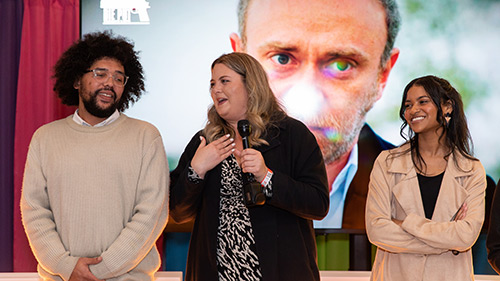
The other production house that dubs the shows is called Overklank at Atlantic Studios - the same studios where Arendsvlei, Suidooster and Deal or No Deal are filmed. This is production manager Gabby Joubert with sound engineer Chad Lategan, who's worked on Die Put and Elif amongst others.
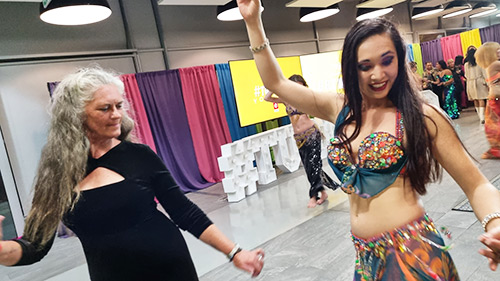
But what about Die Put's famous Number 1 fan?! - we hear you ask.
Yes, well... at first we thought we knew who she was because she loves the show so much she's been inked - no jokes! - but now we're having second and third thoughts because we met three fans who could each take the title for their own reasons.
They were part of a group of 10 viewers who won a trip to Turkey last year after entering a competition on eExtra.
It ran from 8 August to 12 September, between 17h30 and 22h30 each night, and they had to identify the shows and characters via SMS.
We'll leave it up to you to decide on who takes the Number 1 title.
Introducing...
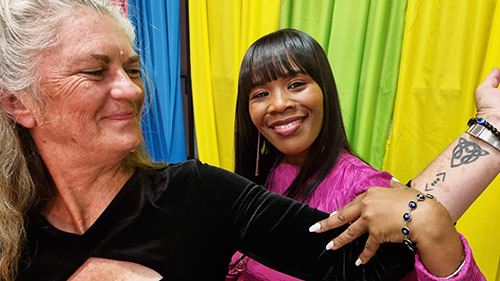
Charmain Karam and Bianca Daniels. Buddy-buddy after their trip, which included set visits to Doodsondes and Die Put. Each wearing evil eye bracelets.
Charmain has a tattoo of the Koçovali symbol, for real and
not temporary.
An explanation of it as interpreted by Charmain and Bianca:
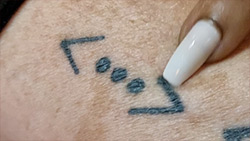
The roof. This represents the Koçovali family as a whole.
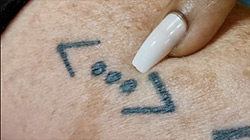
This symbolises immediate family - mother, father, brothers etc.
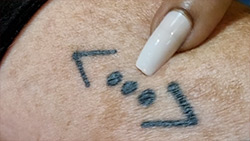
Extended family and friends i.e. Anyone who would take a bullet for you and vice versa.
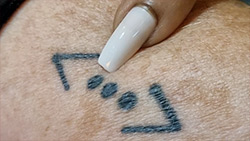
The neighbourhood of Çukur.
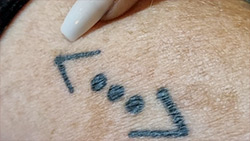
This symbolises that whenever you're lost, you can always go back to the family of Koçovali.
What is it about Die Put that they love so much? Why the fandom?
Introducing Brionnee Miller:
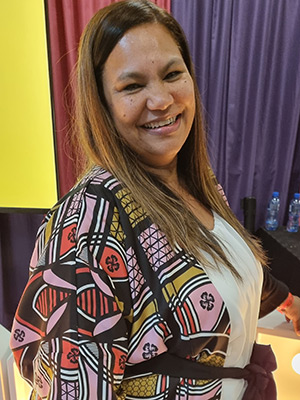
- who works at the Victory Outreach project.
They share their reasons:
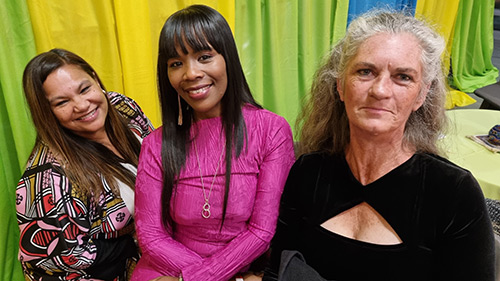
Brionnee: For me being from Cape Town, the work that I do sometimes, is with people on the street, and they come from the gangsterism background. Die Put is also very gangster, in and out of prison, so I can relate and it's also the family dynamics,"
Charmain and Bianca: Yes!
Brionnee: How they all just stick together, how they stand up for each other and the community, how the community will actually keep quiet, you know, to cover for them. And you see that on the Cape Flats.
Bianca: That is what the tattoo's all about. It's where we come from. It's because there's lots of people on the street, it's because there's lots of homeless kids on the street, and that steals my heart.
Çukur is all about the children on the street, taking them in and looking after them - caring for them and then eventually they grow up in Baba Idris' household.
They grow and have a father, they have a mother, because there's the Koçovali mother, the Koçovali father, so basically they're all in it. It's very close to my heart in a sense of, like Brionnee says, it's everything in Cape Town.
Charmain: And he built it from scratch, there was nothing, and he left his family and he made Die Put, he's the father of everyone.
Bianca: It's also something that, you know, you can't look past certain that they are doing, but they're doing it to protect others. It's that kind of thing. "I love you so much, I will protect you, I will go to the extreme."
Charmain: You're my brother, you're my sister. You touch my family, ek gaan jou wys. (I'll show you)
Bianca: It's also their culture in Istanbul - very Cape Malay. You can literally buy food from the street - I love the chicken kebabs that they have. I felt that's home Number 2.